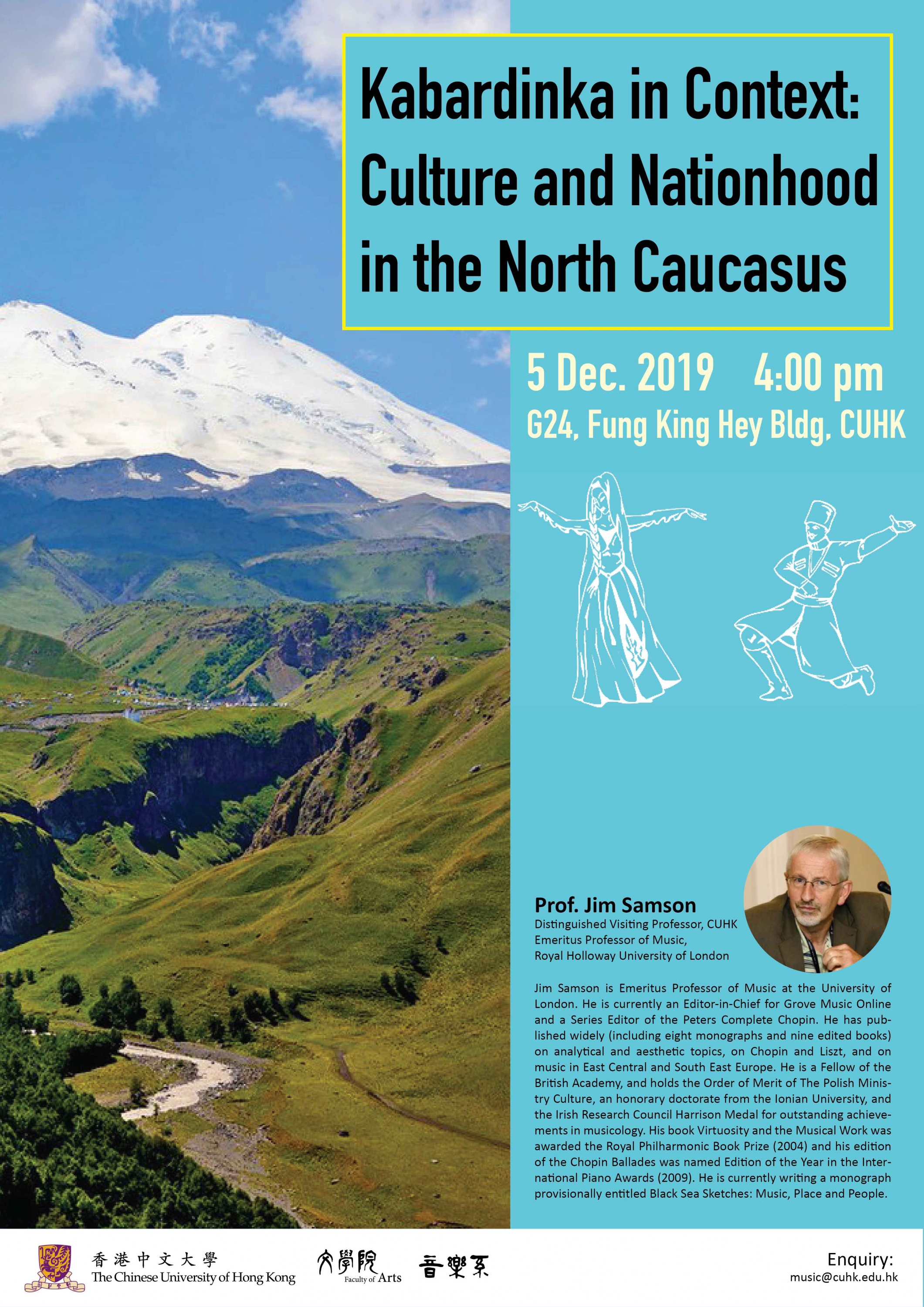活动
Faculty of Arts: Lecture by Professor Jim Samson on “Kabardinka in Context: Culture and Nationhood in the North Caucasus”
2019年12月5日
4:00pm
Arts and Humanities Hub, G24, Fung King Hey Building
Professor Jim Samson, Distinguished Visiting Professor of the Department of Music and Emeritus Professor of Music at the University of London
Jim Samson is Emeritus Professor of Music at the University of London. He is currently an Editor-in-Chief for Grove Music Online and a Series Editor of the Peters Complete Chopin. He has published widely (including eight monographs and nine edited books) on analytical and aesthetic topics, on Chopin and Liszt, and on music in East Central and South East Europe. He is a Fellow of the British Academy, and holds the Order of Merit of The Polish Ministry Culture, an honorary doctorate from the Ionian University, and the Irish Research Council Harrison Medal for outstanding achievements in musicology. His book Virtuosity and the Musical Work was awarded the Royal Philharmonic Book Prize (2004) and his edition of the Chopin Ballades was named Edition of the Year in the International Piano Awards (2009). He is currently writing a monograph provisionally entitled Black Sea Sketches: Music, Place and People.
Tel: 3943 7107 (Ms Sonia Yip)
1989 was a ‘continuation’ of 1968 in ways other than those cited by Arrighi, Hopkins and Wallerstein in their now classic text. This paper demonstrates that the notional pre-Soviet realities associated with the cultural revival post-1989 were based on Soviet constructions of a national past and that in the end cultural forms served to ground and reinforce those constructions.
Professor Samson will use as reference points Kabardinka, the State Ensemble of Kabardino-Balkaria, and its host city Nal’chik, which is positioned between Maykop (in Adyghea) and Grozny (in Chechnya) in more than just a geographical sense. The changing profile of this ensemble in Soviet and post-Soviet times will be documented, as will the fortunes of its one-time Director Auladin Dumanish. So too will be the reaction against a Soviet concert aesthetic in post-Soviet years, manifest in two very different movements in Nal’chik, both cultivated in the spirit of dissident Circassian nationalism. One concerned the putative conservation of ancient agrarian repertories by small groups of purists with very limited visibility, while the other involved an experimental modernization of repertory for present-day audiences, involving transformations and fusions of various kinds (not really to be confused with the ethno-pop one hears everywhere in the city). He will suggest that these reactions against the concert aesthetic were both a legacy of the Soviet institutionalization of ethnic identities and a mark of the imperative to redefine those identities.
He will further argue that the Soviet concert aesthetic, in relatively undiluted form, has a present-day afterlife not in Kabardino-Balkaria, which is a Republic of the Russian Federation, but in the Kabardian diaspora, and especially in modern Turkey. Here, in cities such as Kayseri and Ankara, the Soviet ethos of folk professionalism is alive and well among Circassian communities. The ensembles associated with Circassian derneks in those cities are all but indistinguishable from Kabardinka. Finally I will comment on the status of return and returnees in the aftermath of 1989
The talk will last for an hour, to be followed by a 30-minute floor discussion. Light refreshments will be provided after the talk and you could enjoy a good chat with others.


